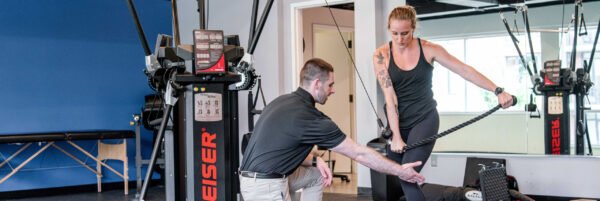Physical therapy plays an integral role in the world of sports, particularly for young athletes navigating the challenges of high school sports.
After opening our new facility in Bethesda, my return to treating patients has once again shown me the critical role that physical therapy and physical therapists play in the health, recovery, and performance enhancement of these young individuals.
Our afternoons are bustling with the energy of high school athletes, many of whom bring a fervor and intensity to their training that, while commendable, often needs a more informed approach to be sustainable and beneficial in the long term.
The Role of Physical Therapists in Youth Sports
Physical therapists specialize in understanding the complex dynamics of the human body, especially how it heals, adapts, and improves with proper training and rehab. In the context of high school athletics, a physical therapist’s role transcends mere rehabilitation; it encompasses prevention, education, and performance optimization. We see a common thread among young athletes: a passion for their sport that sometimes leads to overzealous training habits.
Overtraining: The Pitfall of Youthful Exuberance
The notion of overtraining is not new, yet it remains a prevalent issue among high school athletes. The invincibility felt by the youth can often lead to pushing their limits, participating in multiple teams, and juggling a demanding academic schedule. This relentless pursuit of excellence, while admirable, can lead to compromised techniques and an elevated risk of injuries. Herein lies the importance of physical therapy – guiding these athletes towards more mindful, strategic approaches to training that emphasize recovery, technique, and balanced physical development.
The Overlooked Aspects of Performance Training
In the age of social media, the allure of “exciting” training routines is undeniable. Yet, it is the foundational aspects of youth sports performance training – such as mobility, stability, and foundational movement skills – that often go overlooked. The basics don’t get a lot of likes on Instagram!
Physical therapists are adept at identifying these gaps and implementing training regimens that address these vital components. Exercises like Forward Bounds and Forward Hops are examples of specific drills that we use to teach essential skills, highlighting the need for a nuanced approach to training that balances the exciting with the essential.
The Need for Individualized Training Programs
Another critical area where physical therapists make a significant impact is in the development of individualized training programs. High school athletes, particularly those recovering from injuries, require tailored programs that consider their unique needs, strengths, and weaknesses. Generic training programs often do not address these nuances, potentially hampering an athlete’s recovery and performance enhancement. A physical therapist’s expertise in creating customized training plans is invaluable, ensuring each athlete’s journey towards optimal performance is both efficient and safe.
Encouraging a Holistic Approach
For athletes motivated to excel, the guidance of a physical therapist can be transformative. It is not merely about correcting mistakes but fostering a holistic approach to training that integrates physical wellness, injury prevention, and performance optimization. Our training programs embody this philosophy, offering young athletes a comprehensive foundation upon which to build their sporting endeavors. To learn more about our training programs, click here!
Physical therapy and physical therapists occupy a central role in the health and performance of high school athletes. Through their expertise in rehabilitation, injury prevention, and performance training, they guide young athletes towards more sustainable, effective training practices. The lessons learned extend beyond the gym or field, instilling a mindset that prioritizes overall health, well-rounded development, and the long-term enjoyment of sports. As we continue to support these young athletes at our Bethesda and McLean facility, the value of physical therapy remains abundantly clear – it is not just about rehabilitation but about fostering a generation of athletes who are as healthy as they are talented.
